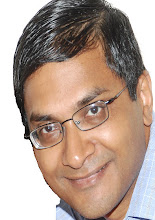Liberals want progressive taxes where the rich pay a larger part of their income and poorer people less part of their income since they have that much less to spare.
Conservatives and rich folks believe that the poor are slackers and want to live of the fat of the land. They would like a flat tax where everyone pays the same percent of their salary in taxes. Even better, why not tax based on consumption. Most economist consider this regressive, since consumption accounts for most of a lower income family while forming just a small fraction for the rich.
Middle class looks with envy at the rich and want them to pay more in taxes. They also look down at the poor and hate any entitlement programs that does not target the middle class such a tax write off for sneezing.

So here is my simple (or simplistic) taxation plan. It is progressive in the sense that the rich will pay a larger percentage of their salary than the poorer. The are only four variables or levers
Rmin - Minimum tax rate = 0% hence this is really not a variable.
Exemption Amount - for self and dependents.
Rmax - Maximum tax rate
Smin - Maximum salary at which taxation would still be 0%. This number is based on 1 exemption.
Sman - Minimum salary at which taxation rate would not longer increase. This number would be based on 1 exemption.
All income would be treated equally and no special benefits would be given for investments. In short, there is absolutely no other exception. This model can be extended to both State and City taxes.
Some examples for Federal Taxes.
Exemption = $5,000.00
Rmax = 20%
Smin - 50,000.00
Smax = 250,000.00
A single person having an income of 50,000.00 or less would not pay any taxes.
A family of 4 having an income of 65,000.00 or less would not pay any taxes.
A single person having an income of 250,000.00 would pay 20% taxes.
A family of 4 having an income of 265,000.00 or more would pay 20% taxes.
What do you think of this idea? Naive? If so, why? Don't you think every economic policy, although well intentioned, has always created distortions and finally proven the truth of of Law of Unintended Consequences?
Conservatives and rich folks believe that the poor are slackers and want to live of the fat of the land. They would like a flat tax where everyone pays the same percent of their salary in taxes. Even better, why not tax based on consumption. Most economist consider this regressive, since consumption accounts for most of a lower income family while forming just a small fraction for the rich.
Middle class looks with envy at the rich and want them to pay more in taxes. They also look down at the poor and hate any entitlement programs that does not target the middle class such a tax write off for sneezing.

So here is my simple (or simplistic) taxation plan. It is progressive in the sense that the rich will pay a larger percentage of their salary than the poorer. The are only four variables or levers
Rmin - Minimum tax rate = 0% hence this is really not a variable.
Exemption Amount - for self and dependents.
Rmax - Maximum tax rate
Smin - Maximum salary at which taxation would still be 0%. This number is based on 1 exemption.
Sman - Minimum salary at which taxation rate would not longer increase. This number would be based on 1 exemption.
All income would be treated equally and no special benefits would be given for investments. In short, there is absolutely no other exception. This model can be extended to both State and City taxes.
Some examples for Federal Taxes.
Exemption = $5,000.00
Rmax = 20%
Smin - 50,000.00
Smax = 250,000.00
A single person having an income of 50,000.00 or less would not pay any taxes.
A family of 4 having an income of 65,000.00 or less would not pay any taxes.
A single person having an income of 250,000.00 would pay 20% taxes.
A family of 4 having an income of 265,000.00 or more would pay 20% taxes.
What do you think of this idea? Naive? If so, why? Don't you think every economic policy, although well intentioned, has always created distortions and finally proven the truth of of Law of Unintended Consequences?
